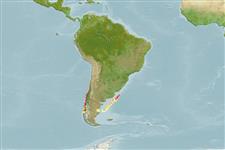>
Gadiformes (Cods) >
Macrouridae (Grenadiers or rattails)
Etymology: Coelorinchus: Greek, koilos = a hollow + Greek, rhyngchos = jaw (Ref. 45335).
More on author: Iwamoto.
Environment: milieu / climate zone / depth range / distribution range
Ecologia
marino benthopelagico; non migratori; distribuzione batimetrica 119 - 450 m (Ref. 1371). Subtropical; 30°S - 56°S, 80°W - 54°W (Ref. 1371)
Southeast Pacific and Southwest Atlantic: Chile (up to 41°S) and Argentine Patagonia.
Size / Peso / Age
Maturity: Lm ? range ? - ? cm
Max length : 39.0 cm TL maschio/sesso non determinato; (Ref. 1371)
Spine dorsali (totale) : 0; Spine anali: 0. Head large; eyes large; snout short and bluntly pointed. Body elongated, tapering abruptly from the first dorsal-fin base. Light organ rather short, extending in front of the anus within the body wall as a flattened, elongate diverticulum falling well short of the pelvic fin bases. Scales rather large and deciduous. Color is brownish to swarthy; the trunk bluish to violet; the fins dusky to blackish. A prominent blackish area behind the pectoral fin bases. The mouth and gill cavities pale.
Feeds on copepods, pagurid and brachyurid crabs, and shrimp-like crustaceans.
Life cycle and mating behavior
Maturities | Riproduzione | Spawnings | Egg(s) | Fecundities | Larve
Cohen, D.M., T. Inada, T. Iwamoto and N. Scialabba, 1990. FAO species catalogue. Vol. 10. Gadiform fishes of the world (Order Gadiformes). An annotated and illustrated catalogue of cods, hakes, grenadiers and other gadiform fishes known to date. FAO Fish. Synop. 125(10). Rome: FAO. 442 p. (Ref. 1371)
IUCN Red List Status (Ref. 130435)
Threat to humans
Harmless
Human uses
Pesca: scarso interesse commerciale
Strumenti
Special reports
Download XML
Fonti Internet
Estimates based on models
Preferred temperature (Ref.
123201): 7 - 10.5, mean 9.5 °C (based on 12 cells).
Phylogenetic diversity index (Ref.
82804): PD
50 = 0.5000 [Uniqueness, from 0.5 = low to 2.0 = high].
Bayesian length-weight: a=0.00251 (0.00128 - 0.00492), b=3.19 (3.03 - 3.35), in cm total length, based on LWR estimates for this Genus-body shape (Ref.
93245).
Trophic level (Ref.
69278): 3.4 ±0.49 se; based on food items.
Resilienza (Ref.
120179): Basso, tempo minimo di raddoppiamento della popolazione 4.5 - 14 anni (Preliminary K or Fecundity.).
Fishing Vulnerability (Ref.
59153): Low to moderate vulnerability (29 of 100).
Nutrients (Ref.
124155): Calcium = 57 [28, 117] mg/100g; Iron = 0.779 [0.420, 1.388] mg/100g; Protein = 16.6 [14.4, 19.0] %; Omega3 = 0.228 [0.112, 0.422] g/100g; Selenium = 44.1 [19.5, 91.3] μg/100g; VitaminA = 19.6 [5.3, 72.9] μg/100g; Zinc = 0.869 [0.588, 1.313] mg/100g (wet weight);
